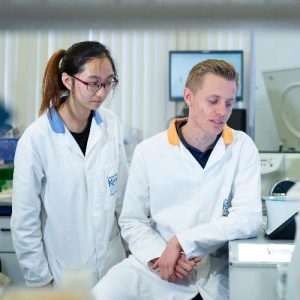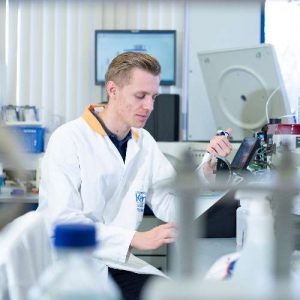Summer 2018 saw a successful return of the School of Biosciences funded internship programme, with 11 students taking part in a wide variety of projects that included work on reproduction, cancer cell proliferation and protein biology. The programme gives students completing their second year of undergraduate study the opportunity to work on original projects within existing research teams, giving them valuable insight into the realities of genuine scientific research.
Amongst this year’s cohort of internship students were Xue Yi Ngan and Joseph Cassar, both students of Biomedical Sciences.
Xue Yi first heard about the summer internship programme during her first year at Kent. She always knew she wanted to gain some additional experience in a lab and appreciated the accessibility of the Kent programme and the wide variety of available projects. She emailed a number of potential supervisors before being offered Ja position with the Kent Fungal Group.
Xue Yi completed her internship under Dr Alessia Buscaino. She spent eight weeks studying the yeast Scheffersomyces stipitis, a distant relative of the more well-known yeast species Saccharomyces cerevisiae. S. stipitis has advantages over S. cerevisiae when it comes to the processing of waste products that are formed through the use of second-generation biofuels. Xue Yi helped to lay the groundwork for future work on the genetic manipulation of S. stipitis, utilising advanced techniques such as the CRISPR Cas-9 system for genome editing and whole genome sequencing.
Xue Yi found that one of the most positive aspects of the experience was learning to embrace the mistakes that you will inevitably make and to ‘dare to explore’. She found the team she was working with to be incredibly supportive and helped to build her confidence in her lab work. As she put it, ‘it’s exciting to see what you can do!’
Joseph decided to apply for an internship after speaking to his academic adviser. He was keen to get more experience in the lab and to spend some time working at the cutting-edge of science. He described the team he was working with as fantastic, with ‘an infectious enthusiasm to strive to make breakthroughs’.
Joseph’s 12-week project in Dr Ortega-Roldan’s lab saw him studying the interactions of zinc with the chloride ion channel CLIC-1, a membrane protein which is over expressed in cancer cells. The project allowed him to gain experience in using techniques such as NMR, nanodisc construction and bioinformatics, experience which Joseph is confident will boost his job prospects in the future. He approached his internship as a trial run for a research career, but enjoyed the work so much that, not only does he feel more certain about continuing with research after completing his studies, he hopes to work with membrane proteins again as part of his third-year project. Joseph has the following advice for prospective interns: ‘If you’re um-ing and ah-ing about a research career, you should definitely go for it!’
How to get involved
Funded positions are available at either the University of Kent or at other locations both nationally and internationally, to second-year undergraduates in the School of Biosciences. If you are interested in finding out more, you can contact Professor Mick Tuite at M.F.Tuite@kent.ac.uk



